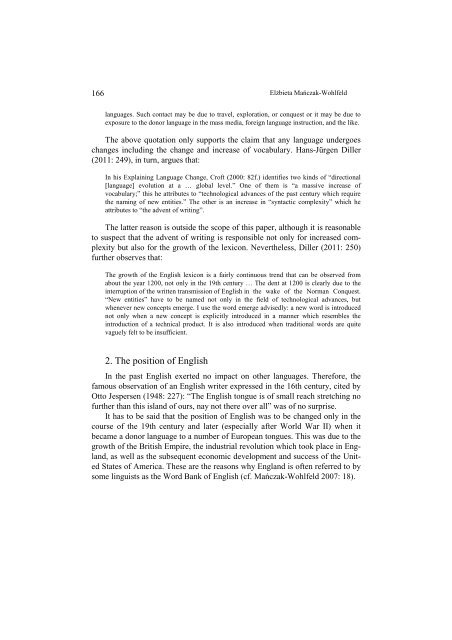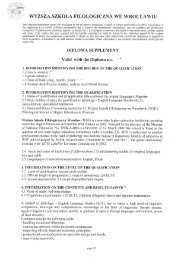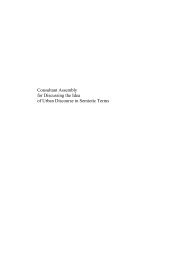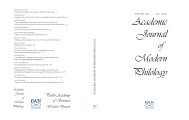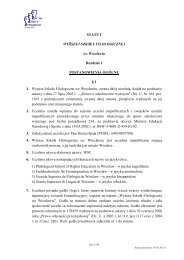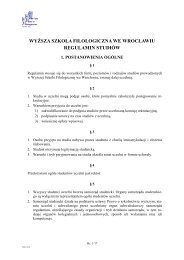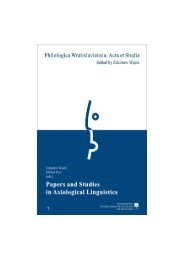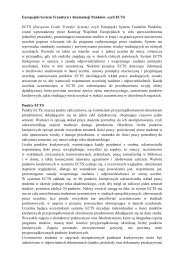s - Wyższa SzkoÅa Filologiczna we WrocÅawiu
s - Wyższa SzkoÅa Filologiczna we WrocÅawiu
s - Wyższa SzkoÅa Filologiczna we WrocÅawiu
Create successful ePaper yourself
Turn your PDF publications into a flip-book with our unique Google optimized e-Paper software.
166<br />
Elżbieta Mańczak-Wohlfeld<br />
languages. Such contact may be due to travel, exploration, or conquest or it may be due to<br />
exposure to the donor language in the mass media, foreign language instruction, and the like.<br />
The above quotation only supports the claim that any language undergoes<br />
changes including the change and increase of vocabulary. Hans-Jürgen Diller<br />
(2011: 249), in turn, argues that:<br />
In his Explaining Language Change, Croft (2000: 82f.) identifies two kinds of “directional<br />
[language] evolution at a … global level.” One of them is “a massive increase of<br />
vocabulary;” this he attributes to “technological advances of the past century which require<br />
the naming of new entities.” The other is an increase in “syntactic complexity” which he<br />
attributes to “the advent of writing”.<br />
The latter reason is outside the scope of this paper, although it is reasonable<br />
to suspect that the advent of writing is responsible not only for increased complexity<br />
but also for the growth of the lexicon. Nevertheless, Diller (2011: 250)<br />
further observes that:<br />
The growth of the English lexicon is a fairly continuous trend that can be observed from<br />
about the year 1200, not only in the 19th century … The dent at 1200 is clearly due to the<br />
interruption of the written transmission of English in the wake of the Norman Conquest.<br />
“New entities” have to be named not only in the field of technological advances, but<br />
whenever new concepts emerge. I use the word emerge advisedly: a new word is introduced<br />
not only when a new concept is explicitly introduced in a manner which resembles the<br />
introduction of a technical product. It is also introduced when traditional words are quite<br />
vaguely felt to be insufficient.<br />
2. The position of English<br />
In the past English exerted no impact on other languages. Therefore, the<br />
famous observation of an English writer expressed in the 16th century, cited by<br />
Otto Jespersen (1948: 227): “The English tongue is of small reach stretching no<br />
further than this island of ours, nay not there over all” was of no surprise.<br />
It has to be said that the position of English was to be changed only in the<br />
course of the 19th century and later (especially after World War II) when it<br />
became a donor language to a number of European tongues. This was due to the<br />
growth of the British Empire, the industrial revolution which took place in England,<br />
as <strong>we</strong>ll as the subsequent economic development and success of the United<br />
States of America. These are the reasons why England is often referred to by<br />
some linguists as the Word Bank of English (cf. Mańczak-Wohlfeld 2007: 18).


